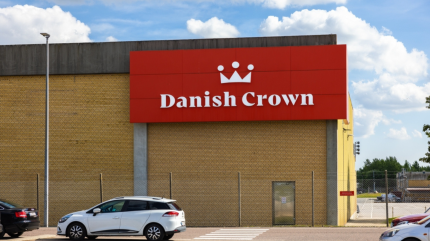
Danish Crown is set to close an abattoir in Denmark after a “challenging two years”, resulting in the loss of around 1,200 jobs.
The pork processor will shut a slaughterhouse in Ringsted by mid-September. It expects to free up around DKr250m ($35.8m) “for other investments over the next three years”.

Discover B2B Marketing That Performs
Combine business intelligence and editorial excellence to reach engaged professionals across 36 leading media platforms.
Jais Valeur, group CEO at Danish Crown, said: “It is a heavy decision to close the abattoir in Ringsted and especially to say goodbye to so many skilled and well-liked colleagues but it is a necessary measure in our efforts to develop Danish Crown’s position as a modern food company.
“In making these changes, we are doing all we can to improve efficiency at the abattoirs and sell many more processed products to our key European customers.”
Last year, the co-operative detailed a cost-savings plan designed to deliver an improvement in operational performance “within” two years, including improving efficiencies in its facilities through technology to cut production costs.
Danish Crown had already been consolidating its network of abattoirs and deboning operations in Denmark and Germany, complete with the loss of jobs, due to a decline in pigs coming in for slaughter from the cooperative’s farmers.

US Tariffs are shifting - will you react or anticipate?
Don’t let policy changes catch you off guard. Stay proactive with real-time data and expert analysis.
By GlobalDataAway from the closure of the Ringsted site, the company added today (18 April) it will create up to 300 new jobs at five other slaughterhouses in Horsens, Herning, Vejen and Blans near Sønderborg.
“The global pork trade has changed significantly in recent years, and the market for exporting pork for processing around the world is now dominated by Spain, the US and Brazil. On the other hand, we see a potential for processed products, with the European market in particular showing considerable interest in the bacon and pepperoni being produced by Danish Crown,” Valeur added.
Since 2021, the number of pigs being sent for slaughter in Denmark has declined significantly, according to Danish Crown, and “it is necessary to accelerate the transition and streamline production even more in order to be able to pay the company’s owners – Danish farmers – a competitive price for their animals”.
It said a “significant chunk” of the production that takes place in Ringsted will move to Danish Crown’s other facilities in Denmark. The company said it “expects there to be enough work for the Ringsted employees who are ready to take a job at one of the company’s four other locations”.
Danish Crown chairman Asger Krogsgaard added: “It’s imperative that something happens now and we’re ready to use all the means at our disposal. During the past 20 years, we have repeatedly either ramped up or reduced our capacity. In other words, either by taking on or laying off hundreds of employees. Paying overtime, training new employees and ensuring we have available capacity are horribly expensive, and it costs millions of kroner each time.
“Therefore, we are now doing all we can to stabilise the cooperative owners’ regular deliveries of pigs, because this is one way in which we can pay the owners a competitive price that matches what is being paid in Europe.”
Earlier this week, Danish Crown brought closure to a legal greenwashing claim by pledging not to use misleading terms about the pork giant’s environmental credentials.
The case surrounds the marketing slogans “Danish pig is more climate-friendly than you think” and “climate-controlled pig”, which elicited a backlash in 2021 from the Danish Vegetarian Association and the Climate Movement in Denmark campaign groups.



